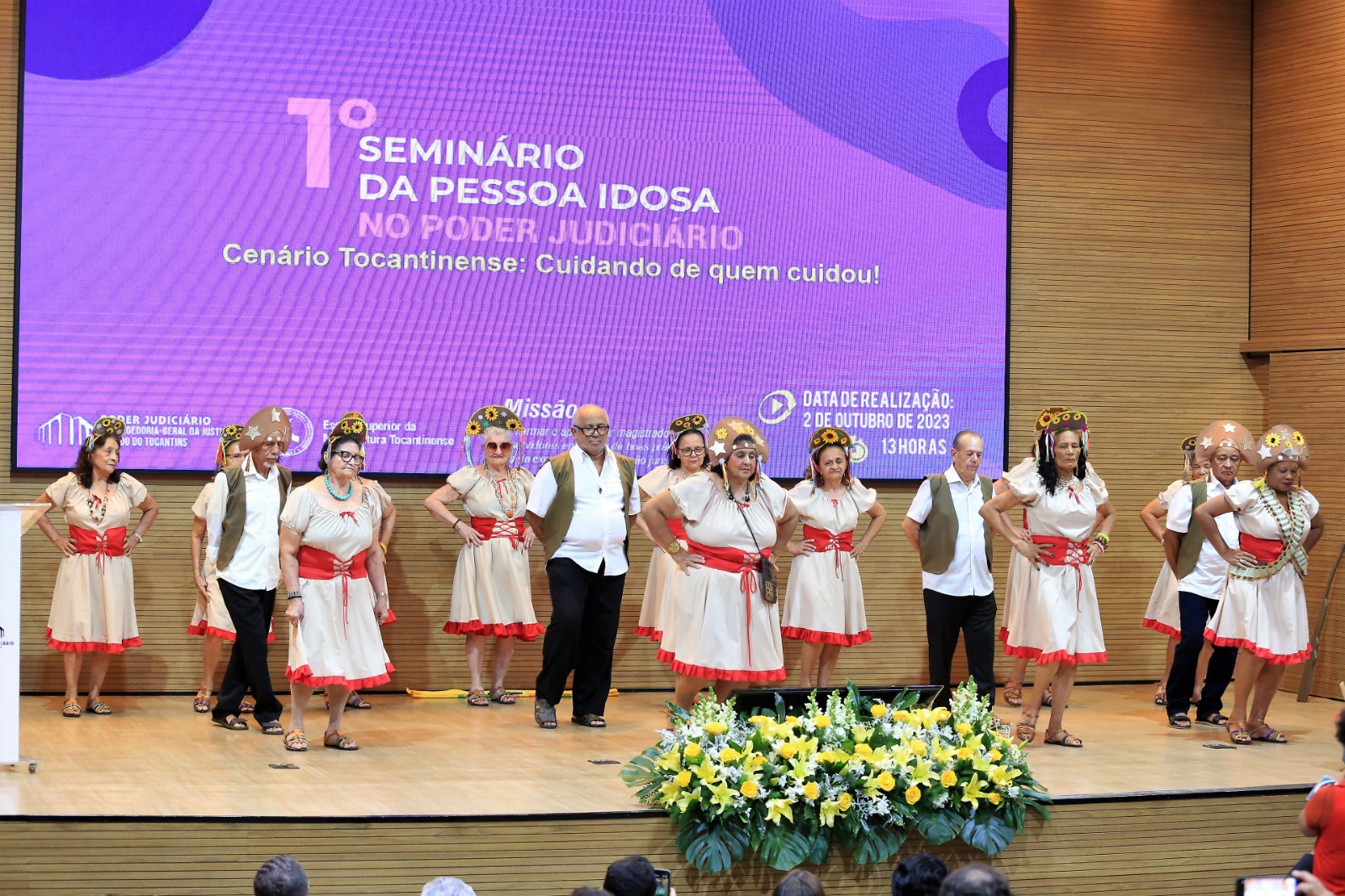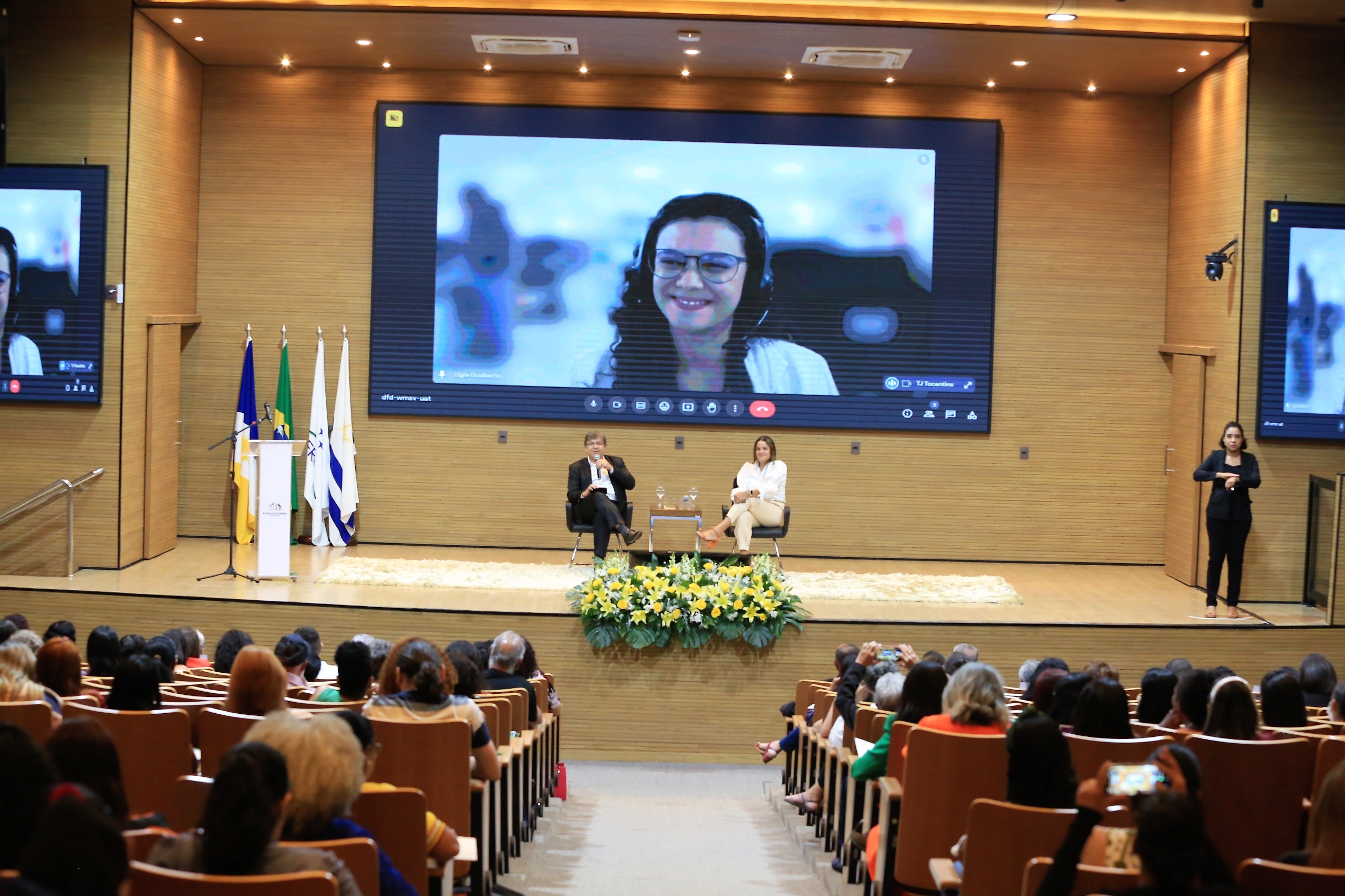
"Ageing is an achievement, we need to start seeing and feeling that ageing is an advance, a testament to the fact that health measures have been effective, that vaccines are effective and that we are combating premature mortality," said doctor Lígia Iasmine Pereira dos Santos Gualberto, coordinator for the health of the elderly in primary care at the Ministry of Health, during her presentation (via videoconference) on the "Network of Care, Assistance and Protection for the Elderly in the State of Tocantins".
Opening the month of October, the panels of the 1st Seminar on the Elderly in the Judiciary, held on Monday afternoon (October 2nd), brought important perspectives and encouragement for a more active participation of society in caring for those who have dedicated their lives to the well-being of all.
Panelist and researcher Érica Pollyana Oliveira Nunes, an accredited GGEM/TJTO professional, shared the stage in the auditorium of the Court of Justice of the State of Tocantins (TJTO) with mediator Judge Ariosténis Guimarães Vieira, coordinator of the Citizenship Coordination of TJTO.
Introducing the doctor Lígia Iasmine, the Judge began his speech by saying that "debating this subject undoubtedly requires knowledge of the Unified Health System and an analysis and reflection on how this much talked about model, which with the pandemic ended up being admired by the whole world, our SUS. We can't have this debate without bringing in someone linked to the Ministry of Health".
Panel 1
With the theme on "Network of Care, Assistance and Protection for the Elderly in the State of Tocantins", Dr. Lígia highlighted the importance of building the debate. "It's an honor to be able to be part of this discussion, and I'm very happy that the issue of the health of the elderly is gaining prominence, the prominence it really needs so that we can discuss it seriously in all aspects, in all sectors of society, arising from the improvement not only of health, but also of all care for the elderly in public services and in all instances," she said.

In a clear presentation, Lígia said that ageing should be seen as a story. "People age differently from each other and experience old age differently. Ageing is not the same for all people, so we need to see that ageing tells a story about the environmental, psychological, social, cultural and economic conditions that that person has been exposed to and experienced over the course of their life," she explained.
She also pointed out that "getting older doesn't mean incapacity, it doesn't mean any kind of relationship with the international disease code. On the contrary, we need to combat the stigmas and prejudices that are often associated with ageing and old age".
In her presentation, Érica presented the mapping process and the results of the research into the network of care, assistance and protection for the elderly in the State of Tocantins.
"We get a picture of the broad framework and its main influences on the realization of the rights of the elderly in the State. So, when we do this mapping, we get this picture. First we need to identify what these equipments are so that we can then think about interconnected actions, actions that can contribute for weaving this network, which is already another movement. At the moment, we're not in the process of identifying this network, and this process of contribution begins today with this seminar," said Érica.
Panel 2
Mediated by Justice Eurípedes do Carmo Lamounier of TJTO, the panel on "Profile of the elderly population in the State of Tocantins: who are our elderly and what are their needs?" presented the profile of the elderly population in the State of Tocantins.
In his speech, Justice Eurípedes mentioned the Judiciary of the State of Tocantins commitment to human rights. "We've talked a lot here about the issue of human rights contemplated by the Constitution of the Republic of Brazil, our Charter of 1988, and it contemplates the issue of the dignity of the human person so well. The state of Tocantins, being a child of this Constitution and having been created with its promulgation on October 5th, 1988, could not be different in its various organs, including the Judiciary, in making this provision of protection to human rights and, at this moment, to the rights of the elderly," he stressed.
Researcher and Master Maísa Carvalho, an accredited GGEM/TJTO professional, and Educator Simone Fontenelle da Silva, General Coordinator of the Executive Secretariat of the National Council for the Rights of the Elderly/CNDPI of the Ministry of Human Rights and Citizenship, were in charge of this second panel.
Maísa explained how the process of profiling the elderly in the State of Tocantins worked and how it was constructed. Based on statistical data, she offered some reflections.
The elderly population in Brazil will exceed two billion by 2050; Brazil will be the fifth country in the world with the largest elderly population, something that makes us wonder. How are we preparing? How has society prepared itself for this population that is growing more and more, not only in numbers, but also in challenges, such as the rate of violence?" she asked.
Addressing the same theme, Educator Simone Fontenelle presented some conceptions, with a theoretical basis on old age, its concept and its construction in Brazil. Simone also presented statistical data, talked about some aspects of legislation that deal with the elderly and the context of Brazilian violence.
“Within all this legal framework that we have in the Statute of the Elderly Person, which covers all areas of ageing, these policies really need to work. It's therefore up to the control bodies, such as the councils, the offices of the ombudsmen, the offices of the public prosecutors , and us, as citizens, to play our part in ensuring that these policies are really implemented to guarantee the well-being of the elderly," she said.
Panel 3
Finally, the last panel featured Researcher Keila Moreira, an accredited GGEM/TJTO professional, and Delegate Cyntia Cristina de Carvalho e Silva, deputy head of the Civil Police of the Federal District - PCDF/DECRIN. Discussing the theme on "Context of violence against the elderly in the State of Tocantins", Cynthia brought her experience as a Delegate in Brasília and stressed that "we need to develop public policies to bring the generations into schools and discuss this [the difficulties between generations]".
The Researcher Keila focused her presentation on the statistical data related to the main types of violence practiced against elderly people in the period from 2018 to 2022 and pointed out that the data showed a greater amount of institutional, physical, psychological and economic/patrimonial violence. Keila also stressed that the results suggest the need for coordinated, systematic and contextualized actions to identify and combat all this violence.




